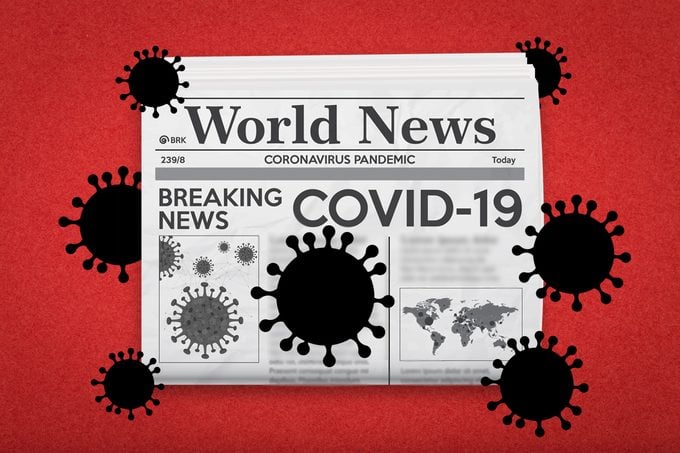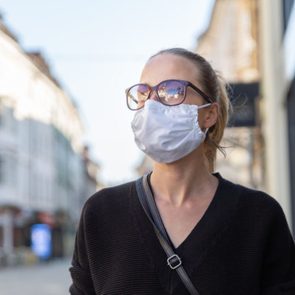Think Coronavirus Is a Hoax? 6 Things that Make It Clear It’s Not
Updated: Jan. 19, 2021
Check the facts and the hard data, coronavirus is not a hoax. Here are six reasons why, according to top health experts.
False claim: Coronavirus is a hoax
“I think I made a mistake. I thought this was a hoax, but it’s not.” Those were some of the last words uttered by a 30-year-old Texas man who attended a “coronavirus party” thinking Covid-19 was a hoax.
The virus proved it was quite real in the worst way possible—he died after contracting it. The public learned about his tragic death when one of his doctors made a plea, begging people to take the virus seriously. Sadly, this is not the only example of someone dying from Covid-19 after being convinced it was a hoax.
In early 2020, when the world learned about the effects of SARS-CoV-2 (severe acute respiratory syndrome coronavirus 2, or the virus that causes Covid-19) during the initial outbreak in China, people took to the Internet to search for information. By the time the pandemic was in full swing, the thirst for any kind of information had become a frenzy, turning into what the World Health Organization (WHO) calls an “infodemic.”
“…[T]he technology we rely on to keep connected and informed is enabling and amplifying an infodemic that continues to undermine the global response and jeopardizes measures to control the pandemic,”says the WHO.
How? By spreading misinformation and disinformation, either intentionally or through ignorance. “Misinformation about this costs lives,” says the WHO. “Without the appropriate trust and correct information […] the virus will continue to thrive.” (Make sure you know how to prepare for a coronavirus winter.)

The coronavirus hoax lies spread like wildfire
Arguably, the most harmful source of misinformation right now is the recurring idea that Covid-19 is a hoax. Perhaps you’ve heard some of the more popular Covid-19 conspiracy theories:
“The virus is just a political tool and will magically disappear after the election.”
“The virus is actually a bioweapon engineered by China to hurt America and there’s a hidden cure.”
“Hospitals are getting paid to inflate the number of Covid-19 cases.”
“The hoax is a ‘plandemic’ designed to make money for Big Pharma by forcing Americans to get a vaccine.”
“Covid-19 deaths are faked. It’s no more dangerous than the flu.”
There is no evidence to support hoax theories and plenty of evidence to refute them. And yet these claims continue to spread like wildfire, says Kathy Lancaster, PhD, an epidemiologist and public health expert at The Ohio State University College of Public Health.
“The promotion of the growing anti-science movement is the most concerning issue in public health to me right now,” she says. “I worry this hurts the prevention and treatment of not just Covid-19, but potentially other health conditions as well.”
To be crystal clear, she adds: “SARS-CoV-2 is a real virus that is highly contagious and can have serious effects on health, potentially leading to death,” she says. “It is not a hoax.”
How coronavirus hoax lies get started
It’s hard to pinpoint the genesis and spread of each bit of false information. But reports suggest they’re being amplified by online organized groups, like QAnon, which promote an array of conspiracy theories. (Facebook and other social media outlets are cracking down and deleting accounts linked to QAnon, an extremist group identified as a domestic terror threat by the FBI.)
In a joint memo in March, U.S. intelligence agencies said much of the disinformation is coming from other countries—mostly Russia—trying to interfere in the U.S. election. Variations on the hoax theme are all over social media and the Internet. They’re even parroted by President Donald Trump, who called the coronavirus “the Democrats’ next hoax.”
This is a huge problem, says Rajeev Fernando, MD, an infectious disease physician, director of the division of infectious diseases at Stony Brook Southampton Hospital in New York, and the first U.S. doctor to investigate the virus in China.
When even top leadership is calling it a hoax, it’s easy to see how citizens are getting confused, he says.
Evidence that coronavirus is not a hoax
There are several key pieces of evidence that disprove most coronavirus hoax lies. Here, our experts break it down.
The first-hand experience of thousands of scientists and doctors
“I’ve been wearing a mask since January 2020,” says Dr. Fernando. “Want to know why? Because I have seen this virus, personally, from the very beginning in China. I have never seen a disease like this before. I’ve watched young, healthy people die in front of me from this virus.
“And I’ll keep saying that as many times as people need to hear it to understand that it’s not just me,” he adds. “Many doctors and scientists have seen the proof Covid-19 exists with our own eyes.”
In fact, the Federation of American Scientists, a group that provides science-based solutions to protect against national and international security threats, started the Coronavirus Project for the purpose of debunking the many coronavirus myths.
The group has published dozens of reports, tracking the trends, hot topics, and impact of science, medicine, and Covid-19 disinformation.
The worldwide data
If the virus were simply a hoax to mess with American politics then why are cases spreading all over the world, asks Carol Winner, a public health expert who has worked with the Centers for Disease Control and Prevention (CDC) and the National Institutes of Health for more than 30 years.
“People are dying all over the world and making this about political motives makes no sense,” she says.
The John Hopkins Coronavirus Resource Center map is one of the most respected and accurate sources of Covid-19 data. Over one million people have died globally.
Don’t trust John Hopkins? The WHO, the CDC, the European Centre for Disease Prevention and Control, and the independently operated Worldometer are all reporting very similar numbers.
The “excess deaths” statistics
A popular hoax talking point is that deaths are being intentionally over-reported when those people really died from other causes or didn’t die at all. Nearly one-third of Americans say they don’t believe that the coronavirus death toll is as high as the official count, according to a July 2020 Axios-Ipsos Coronavirus Index survey.
This survey was released the same day JAMA Internal Medicine reported that Covid-19 cases could be six to 24 times higher than what had been reported.
When talking about how many deaths are really due to Covid-19, one number is particularly important: excess deaths or excess mortality, Lancaster says. Essentially, this is a number comparing how many more people died over the course of this year compared to how many died over the course of previous years. And the data are clear.
Not only are the numbers not lying but there may be even more deaths than are being counted—the excess death count suggests there are about 30 percent more deaths that might be related to Covid-19 than have been officially reported. These can be attributed to the virus, either directly or indirectly, because the pandemic is the only major health-related difference in 2020 compared to previous years, says Lancaster.
An analysis by The New York Times in August found that the death toll was higher than average from March to July—about 200,000 more deaths than expected—even though the official death toll due to Covid-19 was about 140,000 at that time.
Based on CDC data, there have been about 279,700 more deaths than would normally be expected through October 3, 2020. Given that the official death toll for Covid-19 in that time period was 200,499, the pandemic could be causing even more deaths than are officially being reported.
You can find country-by-country information about excess mortality at Our World in Data, a collaborative effort run by researchers at the University of Oxford and a non-profit organization called Global Change Data Lab. They note that there were 260,000 excess U.S. deaths from March 1 to August 16 compared to the average of the five previous years, although the official Covid-19 death toll was 169,000 in that time.
“Already, our routine monitoring in the U.S. and globally is identifying overall increases in death compared to other years,” Lancaster says. “The process of capturing deaths is a complicated process, so what we are seeing may only be the tip of the iceberg. We will likely see deaths related to Covid-19, either directly or indirectly, continue to grow.”
How the medical system works
Many coronavirus hoax theories rely on “Big Pharma” as the bad actor. This theory holds that the virus was manufactured as a way to make money (like through vaccines or treatments) and that drug companies are paying hospitals to lie about Covid-19 deaths.
“This isn’t how the medical system works in the U.S.,” says Winner. “Hospitals are paid by insurance companies for treatment they provide, not per diagnosis made. While there may have been some unethical people in the news, overall hospitals and doctors have no financial incentive to do this.”
In response to the vaccine theory, Dr. Fernando points out that many of the companies developing a Covid-19 vaccine have already pledged to release it for free or low-cost.
The limits of current technology
Microchips in vaccines? 5G towers spreading Covid-19? Changing a person’s DNA through a shot? These things simply aren’t possible with our current technology, Dr. Fernando says.
If scientists could do these things they’d already be using this technology in other ways, adds Winner. Plus, people worried about a tracking device should be more concerned about all the real tracking done through cell phones, computers, and other personal tech, she says.
People who’ve had Covid-19
By this point, nearly everyone knows someone (or knows someone who knows someone) who has had the disease. Find a person you trust and talk to them, personally, about their experience. Many will report mild to moderate symptoms.
But about 15 percent of Covid-19 cases are severe enough to be hospitalized and an additional five percent need intensive care treatment, Dr. Fernando says.
Even people with less severe cases can experience long-lasting Covid-19 symptoms. All of those people should be able to tell you that it’s a real thing. (This man was healthy until he got sick and had a leg amputation due to Covid-19.)
For a more sobering reality check, talk to someone who’s lost a loved one to Covid-19.
Don’t take our word for it—do your own research
Just be sure to check where you are getting your information. Not all news sources are created equal. And while it’s tempting to get the breaking news from Twitter or Facebook, social media is among the least accurate news sources.
For example, nearly two-thirds of Americans reported seeing news and online information about coronavirus seemed completely made up, according to an April 2020 Pew Research Center survey.
Get your information from places backed by scientific or medical institutions, with a good reputation, and take the time to fact check anything that seems off, Dr. Fernando says. “Often, just a little bit of checking is enough to unravel these hoaxes.” The people making these claims will often tell you to trust them and no one else in an effort to keep you from doing your own research, he adds.
Politicians are also not a good source of accurate information as they have an agenda to promote, Dr. Fernando says. “Listen to the experts, we’ve spent our whole careers learning about these things,” he says. Concerned about getting politically biased information? Use this Media Bias chart to find trusted sources.














